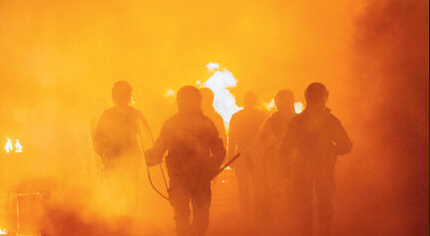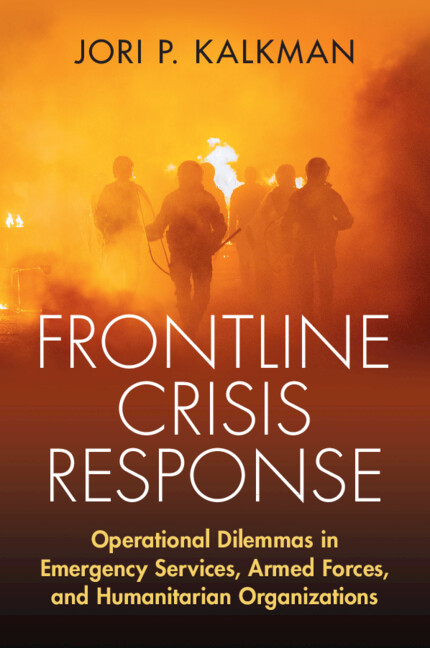
Imagine a crash site. Emergency services rush to the scene of the incident and begin to help. Firefighters, paramedics and police officers are bound to face a number of dilemmas as they carry out their activities. They have operational procedures in place for a range of emergencies, but every situation is unique, so do they follow preexisting protocols or improvise? Similarly, they can focus solely on their own tasks and immediately start helping those in need or they could take some time to coordinate their activities. And what to do with civilians on the site: are they an asset to the crisis response or a nuisance?
Now, imagine a military unit on a combat mission. Beforehand, this unit has received clear instructions from their commander, who has presented a tactical plan and reminded them of the rules of engagement. When in the field, however, enemy troops attack from an unexpected location and with greater numbers than anticipated. The unit is confronted with several urgent questions: do we follow the initial top-down orders or deviate from the commander’s instructions, and to what extent are the preset rules of engagement applicable to the messy, complex reality of the battlefield?
Finally, imagine a humanitarian aid worker arriving in a disaster-stricken area. With large numbers of casualties and a broad range of pressing needs, there are difficult decisions to be made. Should efforts be focused on providing aid immediately or should these crisis professionals focus on gathering information of the situation first, so that scarce resources can be distributed efficiently? And are aid workers supposed to get emotionally involved in the situation or would it be better to keep a rational distance from victims? Even the question what makes a humanitarian aid mission successful has no easy answers, which means that personnel faces difficult choices on what activities to prioritize.
Such dilemmas are complex in the best of times, but frontline crisis responders need to deal with these dilemmas while they are responding to chaotic situations. Their work is further complicated by the fact that they have little time for reflection and deliberation, even though a wrong decision can be deadly. Still, this does not deter them from decisively dealing with these dilemmas on a daily basis. I explore both the nature of the dilemmas and how frontline crisis responders resolve them in my book ‘Frontline Crisis Response: Operational Dilemmas in Emergency Services, Armed Forces, and Humanitarian Organizations’.
In this book, eleven dilemmas are explored and discussed in detail. Drawing from research on crisis operations, I analyze dilemmas related to important crisis management topics, such as leadership, sensemaking, emotions, coordination, and the use of new technologies. Interestingly, scholars have come to very different conclusions and competing recommendations regarding each of these dilemmas. For instance, some scholars call for military-style command and control as the most appropriate leadership style in crises, while others instead propagate decentralized decision-making by frontline personnel. Similarly, some researchers have advocated for strict compliance with preexisting plans and protocols, while other academics promoted improvisation and flexibility as key principles of crisis response. These conflicting claims demonstrate the dilemmas that frontline crisis responders face in their operations: which recommendations are they follow?
Problematically, the fragmentation of research on crisis operations has obscured these competing findings. When emergency management scholars, military researchers, and humanitarian academics have their own journals, their contradictory recommendations may go unnoticed. Yet, frontline crisis responders cannot escape the dilemmas in their work. This book integrates the wide range of crisis response studies and showcases the main dilemmas that crisis professionals face time and again. For each dilemma, it demonstrates how scholars (in different disciplines) have argued for competing solutions to the dilemma as well as the limits of simple choices in complex crisis situations. Finally, it reflects on ways in which crisis responders can and do resolve such dilemmas in practice.
As such, the book provides a comprehensive overview of how frontline crisis responders organize and implement their activities amidst the chaos of crises. First, it demonstrates the persistence and complexity of operational dilemmas in frontline crisis response work. Next, it shows the importance of a pragmatic approach that accounts for situational contingencies and takes heed of crisis response processes. Finally, it features the human, existentialist side of crisis response operations at the frontlines. The book therefore sheds new light on the subject and aims to serve as a foundation for future research.
In a world increasingly beset by crises, the words and actions of public leaders may grasp our attention, but frontline crisis responders save our lives and make a real difference in our societies. As they make great sacrifices to help those of us in need, their work deserves more scholarly attention. This book offers a start by exploring the complex work and great adaptive capacity of frontline crisis responders.

Frontline Crisis Response by Jori P. Kalkman
Latest Comments
Have your say!